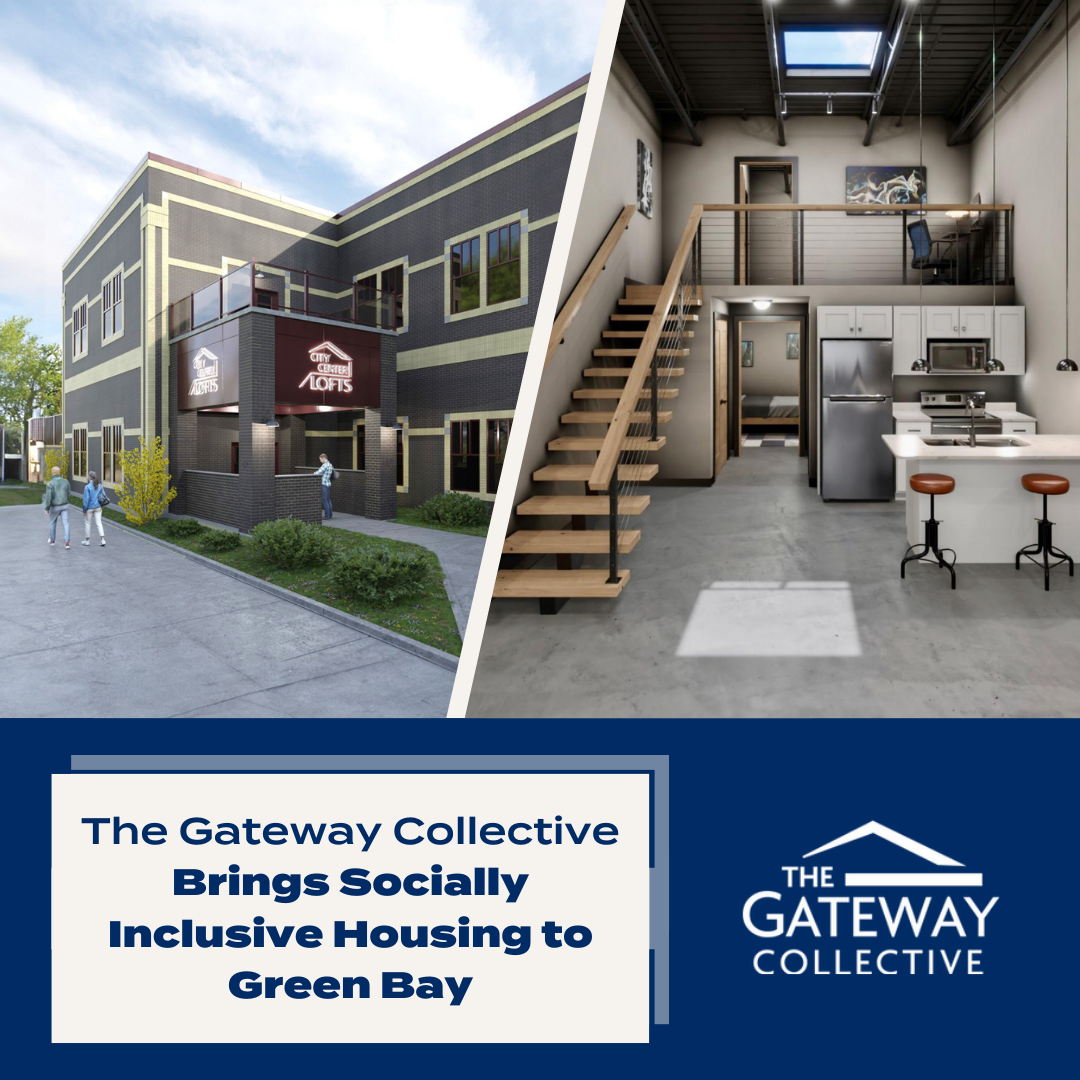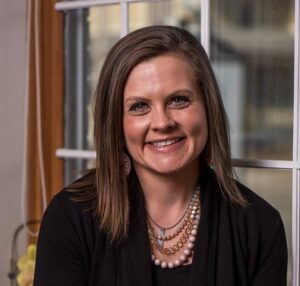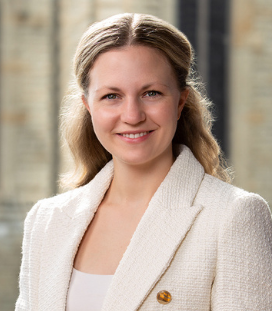According to the doctoral research conducted by Executive Director Dr. Alexia Wood, social isolation is a leading cause of housing instability and homelessness. To tackle this issue from the root, The Gateway Collective, a new nonprofit started by Wood, the former Executive Director of St.John’s Ministries in Green Bay, WI, is working towards creating a socially inclusive, privately funded housing project named City Center Lofts. The project aims to provide high-quality workforce housing for all socioeconomic levels, with a special focus on social connections to help improve life satisfaction, reduce living costs, and promote civic engagement. The project is currently under construction and will be ready to accept tenants next spring.
“This is a new idea, especially for Green Bay,” stated Christian Jensen, Director of Development for the Gateway Collective. “In addition to donors and partners, area employers are keenly aware of the need for affordable housing. Housing instability not only leads to homelessness, it affects a person’s ability to perform at work.”
 Many cities in the US, including Green Bay, do not have enough affordable workforce housing. The City Center Lofts project aims to provide access to housing for people across all income levels and will target young professionals, working families, and aging adults. The development will include 72 apartments of varying sizes. Each unit will feature modern fixtures, appliances, and ample natural light. Additionally, most units will have a second-floor loft. The building will also have several community spaces, such as 16-foot-wide corridors with skylights and a 3,500-square-foot community room.Tenants will have access to indoor bike storage, a fitness center, and grocery delivery services.
Many cities in the US, including Green Bay, do not have enough affordable workforce housing. The City Center Lofts project aims to provide access to housing for people across all income levels and will target young professionals, working families, and aging adults. The development will include 72 apartments of varying sizes. Each unit will feature modern fixtures, appliances, and ample natural light. Additionally, most units will have a second-floor loft. The building will also have several community spaces, such as 16-foot-wide corridors with skylights and a 3,500-square-foot community room.Tenants will have access to indoor bike storage, a fitness center, and grocery delivery services.
 In Spring 2024, City Center Lofts will welcome its first tenants of various socioeconomic classes. Thirty percent will be lower-income workers, forty percent will be Asset Limited, Income Constrained, Employed (ALICE) residents, and thirty percent will be market-rate, households desiring to keep the cost of living competitive while still accessing desirable downtown living.
In Spring 2024, City Center Lofts will welcome its first tenants of various socioeconomic classes. Thirty percent will be lower-income workers, forty percent will be Asset Limited, Income Constrained, Employed (ALICE) residents, and thirty percent will be market-rate, households desiring to keep the cost of living competitive while still accessing desirable downtown living.
Those lower-income and ALICE households will have access to programming and support to develop a strong sense of belonging and assistance to upward mobility. They will have access to a Community Resource Advocate (CRA) who is a connector and advocates on behalf of residents, coaches them, and measures the organization’s impact.
“As part of the move-in process, our CRA will work with each tenant to set individual goals and personally work to get them warm introductions with community resources.”
A portion of the monthly rent will be automatically deposited into a personal savings account. This Resident Investment Program is an incentive for tenants to grow and attain their goals. The funds can be accessed for goals that may include moving into a different apartment, buying a home, or attending college. Tenants who become at risk of eviction can access low to no-interest loans that need to be paid within a year.
As the Gateway Collective gathers data and refines its model, the organization aims to develop further sites for socially inclusive housing. “In addition to housing, we are working towards a community revival and broader community investment by facilitating collaboration between nonprofits, the local government, and private and corporate donors.”
Learn more about The Gateway Collective and City Center Lofts online.
Executive Director Q&A: Dr. Alexia Wood
Dr. Alexia (Lexie) Wood is deeply passionate about impacting change within systemic issues. She offers a wealth of knowledge concerning homelessness, addiction, and mental health, drawing from her 17 years of experience working in the nonprofit sector. Lexie holds a Master of Social Work degree from UW-Milwaukee, and a Doctor of Social Work degree from the University of Southern California, where her research focused on social connectedness as a pathway to overcoming homelessness. As a foster and adoptive mom, she knows the impact of generational poverty and trauma, identifying how early experiences contribute to risk factors later on. This understanding, combined with her extensive doctoral research, serves as the foundation for Socially Inclusive Housing, a proactive, research-based response to the greatest risk factors in the Green Bay community. She provides insight from her depth of nonprofit experience in the following Q&A.
What are some things you know now that you wish you knew when you first started as a nonprofit leader?
I wish I had taken mentors seriously when they talked about boundaries and burnout. I would constantly have individuals telling me the warning signs, and I always thought, “I’m fine. I’m not experiencing any of that!” There was always one more client to serve, one more task to complete. Unfortunately, I had to learn the hard way and by then, I was deep in burnout. It has taken me years to get my health back on track, to find a balance that works between my professional career and my young, growing family, and to be comfortable in my skin regardless of what we’re delivering on in the strategic plan. A lot of that is simply part of growing. And personally, I’ve been blessed with an incredible Board of Directors that have supported me in each season. But if I could go back and talk to my younger self, I’d stress how quickly my kids’ childhoods truly go, and I’d drive home with myself that my identity wasn’t tied to my success.
What has been your biggest source of pride as executive director?
My greatest source of pride is honestly the group of people I have been able to assemble alongside me. From our donors to staff to clients, I have grown so much as a leader by simply ensuring that I am never the smartest person in the room. By constantly finding opportunities to grow from the wisdom and experiences of those who have walked different paths than mine, I have been able to be part of some incredible work that is transforming our community. A lot of it gets tied back to me as the face of an organization, but I am fully aware that any success I have experienced as a leader in the last 12 years has been the work of a true team of passionate individuals. That I’ve been able to share a board room, a cup of coffee, or a workload with some of these individuals is truly my greatest source of pride.
What are your three biggest accomplishments in your career as a nonprofit leader?
I’m really proud of the fact that I got my doctorate while balancing a rapidly growing career and young children. That was a lot to balance, but it has completely transformed the way I view challenges and approach innovation. It has opened doors to some really great relationships that are allowing us to implement some incredible initiatives here in Green Bay. I wrapped that up in December 2019 and I promised myself and my family that 2020 would be a year of rest. While that was certainly not the case, I am proud of how I was able to rally and lead a congregate living, shelter of last resort, with vulnerable adults who worked in various settings throughout the community, through a global pandemic. While it’s a weight I’ll never be able to articulate to those who didn’t experience it, I am so incredibly proud of our team and how we led through that season. Third, I’m really proud that I am still growing and embracing new challenges and opportunities. I’m certainly a “senior” leader in the field at this point, and yet the work is so fresh and energizing. We are implementing an innovative approach to address workforce housing that is truly scalable and capable of ending housing instability in our community. The fact I can lead these efforts to become a reality brings me an immense amount of gratitude and pride.
What are the dominant challenges that you see nonprofit organizations facing and what do you think would be viable solutions?
I honestly believe two of the greatest challenges facing our field are interconnected: burnout and the health of our homes. Nonprofit organizations are tackling really challenging problems in our community. Regardless of what the nonprofit is addressing (homelessness, children, literacy, etc), there are so many external risk factors that are increasing needs in their areas of expertise or impact. As leaders, how do we lead well when the challenges are growing faster than the solutions? I see so many leaders, myself included, who sacrifice health, wellness, and balance for the “greater good”. In doing so, we’re not leading from a place of abundance but, instead, a place of growing deficit. We will never be as impactful as we hope to be if we are not prioritizing ourselves first (which is really hard for a profession focused on serving others!). Along with that, our culture has certainly transitioned from that mentality that you leave home life at the door. We are one person. Our marriages, our children, our finances, and our lives outside of work, are constantly on our minds. Similarly, the challenges we’re facing at work often bleed into the dinner conversation. Nonprofit leaders need to have a holistic approach where we are supported in making sure our home lives are strong before all else. When we do that, we create stronger leaders who accomplish even more for the mission. But without, we’ll continue to see homes struggle, and we’ll continue to see leaders burn out and leave the field. My organization has incorporated a unique Wellness Initiative that has been tremendous. Instead of bringing work stress home with me, it’s created a pocket for me to focus on health and wellness with the support of my employer. That then lets me go home much more active and present to the needs of my home. As a result, I came back to work the next day much more refreshed and focused.
What aspects of nonprofit accounting do you find most challenging?
Many nonprofit leaders climb the ranks through education and degrees in fields such as social work. These degrees do not prepare you for accounting at a Bachelor’s or Master’s level. Most of my understanding of accounting came through on-the-job experience with some great mentors along the way. It was a crash course when I was hired as an Executive Director at 26! Fortunately, I was able to grow with a growing organization and pick up a lot along the way. I don’t know that I can speak to what is most ‘challenging’, but I can say what’s most frustrating. When a committed multiyear donation is made and recorded in the books for the year in which the pledge came in, it can be difficult to continue educating the Board from a cash flow perspective year after year. There are always new members, and we are constantly needing to educate when it should (in my brain) be so much easier to record.
What other executive directors or philanthropic leaders do you look up to?
There are so many leaders that I look to. Without sounding too cliché as a social worker, I truly do love Brene Brown’s work. Specifically, I’m drawn to leaders who seamlessly incorporate faith into their work and those who have balanced home life (with little children) and the demands of high-level leadership. If I need to be hyped up for the work, Ryan Leak is a trustworthy leader I look to.
How do you see the organization changing in the next two years, and how do you see yourself creating that change?
We are so incredibly excited to be introducing an innovative approach to housing! It’s rooted heavily in research and once operational, will generate its own cash to be self-sustaining and scalable. I cannot wait to see and measure its impact over the next 5-10 years! There is so much research showing the impact of housing instability on children: graduation rates, math and reading scores, and future income levels. By serving 5-year-olds with stable, supportive housing we can create a community where they don’t become 25-year-olds in need of shelter in the future. I cannot wait to implement this change, be a leader in the field, and have Green Bay own a model that other communities look to when addressing their own housing challenges.






